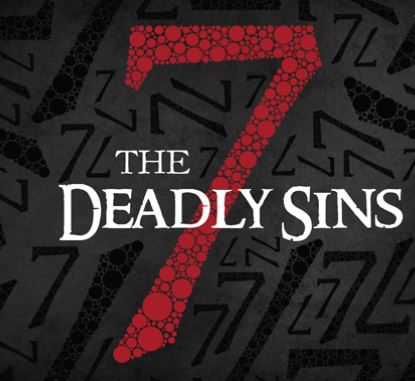It is time for the 7th and final entry for our blog series, “The 7 Deadly Sins of Retirement Planning.” Today we will talk about Mistake #7 – No Strategy for Taxes.
The 7 Deadly Sins Are:
- No Holistic Plan
- No Spend Down Strategy or Exit Plan
- Too Focused On “Growth” Rather Than “Income”
- No Volatility Buffer / Non-Correlated Asset Classes
- Not Risk Smart
- Mistakes with Insurance
- No Strategy for Taxes
People are not tax-smart. Here are some of the common mistakes I see people making:
Not maximizing the employer match on their 401k. If you contribute 5% and your employer matches that 5% contribution, why wouldn’t you take advantage of that? It is free money!
On top of that, it is a guaranteed 100% rate of return!
So, if you contribute $5,000 into your 401k, so does your employer… your retirement nest egg just doubled! From your $5,000 contribution to a $10,000 TOTAL contribution!
Strive to take advantage of it!
Conversely, a second mistake I see is people OVER funding their pre-tax 401k.

Exploding timebomb on a blue background / high contrast image
I know it sounds like I am contradicting what I just said, but I see a lot of people who think they are doing a great job of saving and investing, and what they are actually doing is creating a ticking tax TIME BOMB that is going to go off at the exact wrong time.
What do I mean?
For years, “conventional wisdom” has been that when we retire, we will be in a lower tax bracket, so it’s smart to maximize your pre-tax 401k because when you withdraw, you’ll be in a lower tax bracket.
When the 401k first started being utilized, in the early 1980s, the top tax rates were 50%, 60%, 70%! So back then, it made sense!
Now, the top tax rate (federal) is just 36%.
On top of that, don’t we lose a lot of the credits and deductions that we have during our working years?
Like mortgage interest, student loan interest, having minor children, or children in school?
 In addition, look at our national debt!
In addition, look at our national debt!
It is well over $25 Trillion!!!
Medicare is severely underfunded (projected to become insolvent in 2026) and Social Security is severely underfunded (projected to become insolvent in 2034).
Do you think it is possible that the government increases tax rates to try to fix these problems?
And think about all of our politicians and the increased appetite they have gotten for social programs like free college, free health care, universal basic income, etc.
Where is that money going to come from – who is going to pay for that?
So where do you think tax rates are going to be 20 or 30 years from now when you retire? Higher or lower?
Why are we taking tax deferral now?
Many advisers are telling their clients to take a small deduction – on a relatively small amount of money – and then transfer that money to the future where they have NO WAY of calculating what the tax liability will be!
Make no mistake about it – you have a partner in your 401k, and that is the Internal Revenue Service. People think of their 401k as an asset, but there is a huge liability on that asset.
People should be looking into doing tax-smart things like funding a Roth.
In general (this isn’t specific advice, as a general blanket statement can’t apply to every situation) a person should take full advantage of the employer match, and then funnel the rest of their investable money into a Roth account, like a Roth IRA.
Not everyone  is eligible for a Roth IRA, but if you can, pay the tax now, and then never again.
is eligible for a Roth IRA, but if you can, pay the tax now, and then never again.
If you have access to a Roth 401k, this can be even better, because it does not have the same income limitation. AND the annual contribution limits are much higher!
For the money that you do not want to be exposed to stock market risk or money that you want to position as an income generator, cash value life insurance can be an incredible tool as well!
It offers similar tax benefits, and retirement cash flow distributions are completely tax-exempt when structured properly.
There have also been some recent legislative changes that impact the way that you can leave money to posterity.
The Secure Act brought about changes to the Stretch IRA that make it much less advantageous to leave IRA money to your children.
It is about to the point where if you leave a decent sum of money in an IRA upon death, the Internal Revenue Service will become the primary beneficiary of YOUR life’s work, instead of your children.
Working with an adviser to utilize Roth conversions or permanent life insurance is a big consideration in your legacy planning goals as well.
Working with a retirement specialist will help you to create a strategy for taxes, and help give you the most after-tax spendable income in retirement AND to leave the most tax-free money to your children or favorite charities so that they can enjoy it as well.
That wraps up our 7-part blog series detailing the key mistakes that I see MOST in retirement planning.
I love the retirement planning arena, and I would love to work with you to help you avoid these mistakes and optimize your retirement experience.
Feel free to contact me for a complimentary appointment. Thanks for tuning in!
P.S. If you haven’t checked it out yet, please stop by my mini online seminar How Retirees and Pre-Retirees Can Potentially Avoid Going Broke While Keeping Their Nest-Egg Secure! Tons of great information and bonus is it is 100% COMPLIMENTARY!


Comments are closed